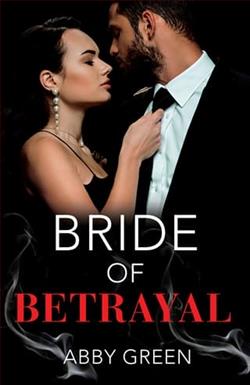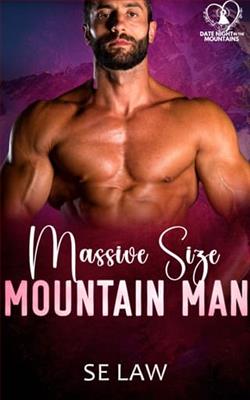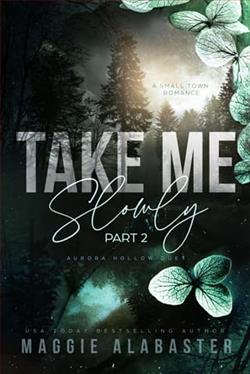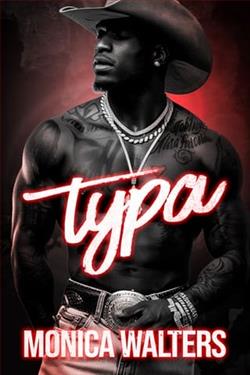Page 86 of An Irish Summer
“Like what?”
“Like it’s beneath you.”
“Collin, I didn’t mean to,” I said, wondering how many times he’s had this thought before. My heart sped up at the thought. “There’s nothing wrong with the work you do.”
“I don’t think I’m the one who needs convincing,” he said, and we lapsed into silence while his words settled in my chest like bricks.
On cue, raindrops began pelting the windows of the train, and I tracked their movements as they raced to the bottom of the glass. Their paths were erratic. They changed direction halfway down the window, joined together and broke apart, sped up and slowed down with no real rhyme or reason.
“And if you think the reason we’re all at the Wanderer is for work,” Collin whispered after a moment, “then you haven’t gotten to know us at all. And if you ever do decide to stay, it will be whenyourealize it isn’t about the work either.”
Nothing I could have said would have been adequate, so I didn’t try. Instead, I settled lower in the seat and let my head drop to Collin’s shoulder. His hand returned to my knee, and I was relieved he seemed to understand I had nothing left to say.
Most of the ride following our conversation passed in a comfortable silence, and he seemed to cheer up significantly as we approached his stop.
“All right,” he said, sitting straight up in his seat and shaking the kinks from his neck. “Remember, Da can be a bit unpredictable, but it’s nothing personal. He’s harmless, really. Just a bit of an old bloke.” I nodded. “And Aileen is going to act like my mam, as always, even though she’s younger. And both she and Niamh are going to ask you a million questions that may or may not be appropriate, so feel free to ignore them. Especially Niamh.”
I shifted uncomfortably, hating the idea of being asked inappropriate questions by strangers but hating the idea of ignoring any of Collin’s family members even more. “Trust me,” he said, sensing my discomfort. “I ignore them all the time. They’re used to it by now. But they’re excited to meet you. All of ’em. No need to be nervous. It’ll be grand.”
Something in his voice wasn’t entirely convincing.
The train groaned to a stop beside a small redbrick structure that I’d hardly have described as a train station so much as a large toolshed. Inside was little more than a pair of turnstiles and an old woman dozing in a ticket booth.
“Welcome to the suburbs.” Collin gestured with his arms in both directions. His wide, lopsided grin eased my increasing anxiety, and I accepted his proffered hand. “It’s just a couple minutes down the road there,” he said, handing me a newspaper from a stack near the exit. “And the rain isn’t lashing yet or anything. All right for a walk?”
It was then that I realized the newspaper was to hold over my head to protect myself from the rain. He was right, it wasn’t lashing, but it was definitely coming down hard enough to ruinmy hair. “You can’t be serious.” I looked at him with disbelief. “I can’t show up to meet your family for the first time like a wet shaggy dog.”
“I’ve seen you after a rainstorm,” he said, “and I can assure you, the rain works for ya.”
The knot in my stomach turned to a flutter at the compliment then back to a knot when I realized he was serious. “We can’t call an Uber or something?”
“Aye, sure, what with all the Ubers in the Irish suburbs. Shouldn’t be a problem at all.” He took out his phone and pretended to open an app I knew he didn’t have. I nearly swatted it out of his hands.
“All right, all right,” I said. “I get it. Walking it is, then. But give me another newspaper. My hair looks good today.”
Beyond the station, the streets were a mix of paved roads and dirt-covered footpaths. We kicked mud into our shoes as we hustled in the direction of his house, sidestepping puddles and ducking under low-hanging tree branches. A collection of two-story homes lined the main road, smoke rising from their chimneys and mixing with the clouds. I wished it wasn’t raining so hard so I could take a good look around. I imagined every iteration of Collin walking through these streets.
By the time we arrived on the doorstep, raindrops clung to our eyelashes, and our chests heaved with deep breaths from the run. I tried to get a good view of the house from the step, wanting to remember every detail. It was a humble whitewashed stone cottage off the main street, complete with window boxes and a thatched roof. The front garden was unruly; rusty tools littered the wet grass among giant weeds and overgrown shrubbery. There were only a few other cottages lining the street, andhad I not done the walk myself I wouldn’t have believed there was a train station only minutes away.
“It’s not much,” Collin said, watching me study the house. I hated how insecure he sounded.
“Collin,” I said, “it’s amazing. It’s so charming. Every house in my neighborhood growing up looked exactly alike. Every house in America looks exactly alike, frankly. When you told me your family had a house outside the city, this is exactly what I hoped it would be.”
“Let’s see if you feel the same after we’re done here.” He smiled. “Ready?” I nodded, and he opened the front door.
We were greeted by the sound of Irish folk music and an intoxicating mixture of smells, both of which felt so homely I forgot I’d never been here before.
“Is that Collin there?” we heard a woman ask from the kitchen. “No, Da, at the door. You didn’t hear the door? Niamh, did you hear the door? Coll, is that you there?”
“Aye, it is us!” Collin called back down the hallway, shaking water from his hair and leaving his shoes on a mat near the door. I did the same, stealing a glance at myself in the mirror on the wall and immediately regretting it. My hair was at once matted to my head and frizzing in all directions, and my mascara was halfway to my cheeks. With a quick swipe under both eyes and a claw clip in my hair, I was as presentable as I was going to get.
“He is here!” the woman, whom I assumed to be Aileen, shouted across the house. “I told you, Da. Niamh, they’re here!”
“We hear ye, Aileen, we hear ye,” Collin’s dad answered from a room off the entryway. “What’s the use for shoutin’ in a house this small?”
“The use is that no one ever listens otherwise,” Aileen said,rounding the corner of the kitchen and coming into view. Collin was right about her acting like a mother. She was about half Collin’s height and wore messy, dark curls in a clip at the back of her head. “Look who made it down from the big city,” she said, pulling him into a hug.
“I’d hardly call Galway ‘the big city,’” he said with a chuckle. “Aileen, this is Chelsea.”















